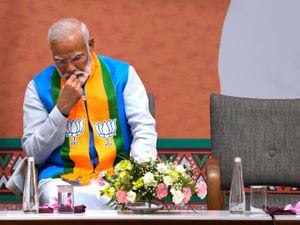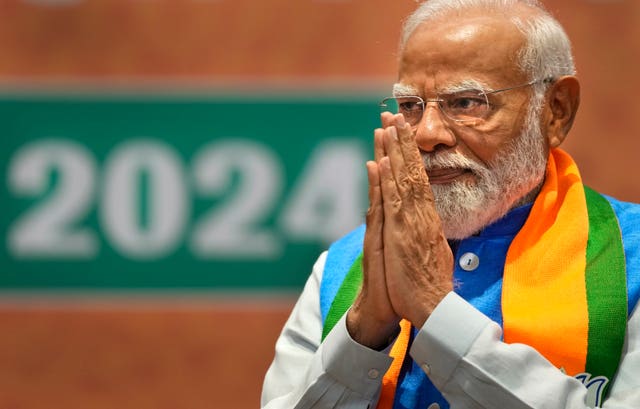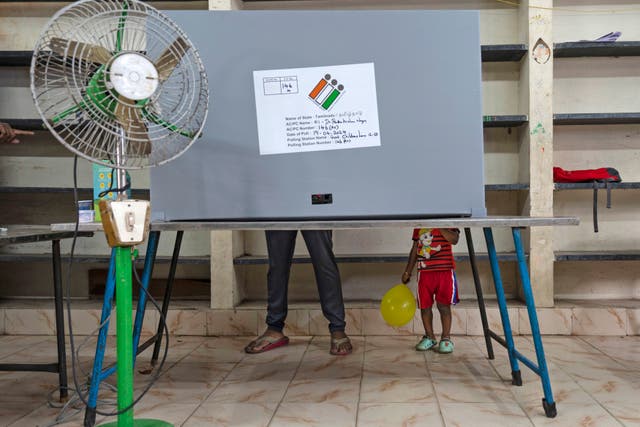Modi accused of hate speech for calling Muslims ‘infiltrators’ at election rally
Critics of the Indian prime minister say the country’s tradition of diversity and secularism has come under attack since his party won power in 2014.

India’s main opposition party has accused Prime Minister Narendra Modi of hate speech after he called Muslims “infiltrators” and used some of his most incendiary rhetoric to date about the minority faith.
Mr Modi made his comments in a campaign rally in the western state of Rajasthan days after the country began its weeks-long general election.
Speaking at the event, Mr Modi said that when the Congress party was in government, “they said Muslims have the first right over the country’s resources”. If it returned to power, the party “will gather all your wealth and distribute it among those who have more children”, he said as the crowd applauded.
“They will distribute it among infiltrators,” he continued, saying: “Do you think your hard-earned money should be given to infiltrators?”
Abhishek Manu Singhvi, a spokesperson for Congress, called the prime minister’s remarks “deeply, deeply objectionable” and said the party had sought action from the Election Commission of India, which oversees the six-week voting period. The first votes were cast on Friday.
The remarks sparked fierce criticism for peddling anti-Muslim tropes, and for breaking election rules which bar candidates from engaging in any activity that aggravates religious tensions.
The Election Commission of India’s model code of conduct forbids candidates to “appeal to caste or communal feelings” to secure votes.
Asaduddin Owaidi, a Muslim lawmaker and president of the All India Majlis-e-Ittehad-ul-Muslimeen party, said on Sunday: “Modi today called Muslims infiltrators and people with many children. Since 2002 till this day, the only Modi guarantee has been to abuse Muslims and get votes.”

Critics of Mr Modi — an avowed Hindu nationalist — say India’s tradition of diversity and secularism has come under attack since his party won power in 2014 and returned for a second term in 2019.
They accuse Mr Modi’s Bharatiya Janata Party (BJP) of fostering religious intolerance and sometimes even violence.
The party denies the accusation and say their policies benefit all Indians.
But human rights groups say that attacks against minorities have become more brazen under Mr Modi. Scores of Muslims have been lynched by Hindu mobs over allegations of eating beef or smuggling cows, an animal considered holy to Hindus. Muslim businesses have been boycotted, their homes and businesses have been bulldozed and places of worship set on fire. Some open calls have been made for their genocide.
Mr Modi’s remarks were based on a 2006 statement by then-prime minister Manmohan Singh of the Congress party.
Mr Singh said that India’s lower castes, tribes, women and “in particular the Muslim minority” were empowered to share in the country’s development equally.
“They must have the first claim on resources,” Mr Singh had said.
A day later, his office clarified that Mr Singh was referring to all of the disadvantaged groups.
Mr Modi and his Hindu nationalist BJP are expected to win, according to most surveys. The results are due on June 4.
The Congress party’s president, Mallikarjun Kharge, described Mr Modi’s comments as “hate speech”.

“In the history of India, no prime minister has lowered the dignity of his post as much as Modi has,” Mr Kharge wrote on social media platform X, formerly Twitter.
In its petition to the election commission, the party said that Mr Modi and the BJP had repeatedly used religion, religious symbols and sentiments in their election campaign with impunity.
“These actions have been further bolstered by the commission’s inaction in penalising the prime minister and the BJP for their blatant violations of electoral laws,” it said.
The commission’s code of conduct is not legally binding on its own, but it can issue notices and suspend campaigners for a certain amount of time over violations.
“We decline comment,” a spokesperson for the commission told the Press Trust of India news agency on Monday.





